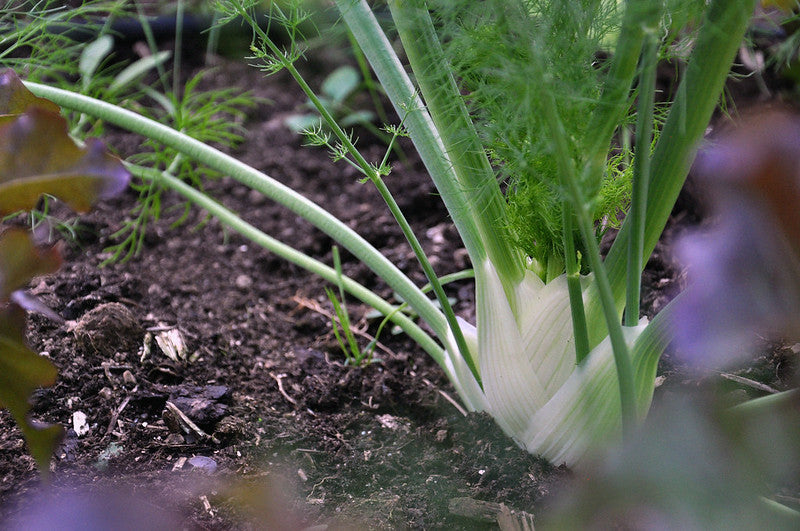We are quickly approaching our last frost dates here in Southern Oregon and so it is time to think about direct seeding all the fun plants that enjoy a warmer soil for growth. One of the finest crossover culinary and medicinal plants that we have here at Siskiyou Seeds is Fennel. This plant is delicious in every form from bulb, to stalk, to leaf, flower and seed.

Image by Jorge Luis Zapico
Even the pollen is regaining popularity in culinary uses. Think fennel pollen sausage...Yum. Fennel is a member of the Apiacea family and has the characteristic feathery fine leaves like dill and carrots. It has a perennial root so as long as you do not harvest the whole plant it will continue to grow. One of my favorite plants to collect seed from is about three years old and lives in the mulched pathways of my herb garden near the roses, a very dreamy combination in the summer. The seeds are ribbed, oblong and slightly curved. Seeds can be chewed to freshen up your mouth, added to meat dishes to aid in digestion and mixed into desserts to add a sweet nutty anise flavor. At Siskiyou Seeds we sell both Fennel Seeds in the medicinal herb category as well as Fennel Perfection, a bulbing fennel whose fleshy white bulb is great for eating fresh in salads or braised, grilled ect.
I am sure I have said this before but my favorite herbs to grow are those like Fennel which are safe for daily consumption and can be considered food as medicine. The bright yellow flowering umbels attract pollinators in the mid Summer. Pick the fresh seed or leaves off the plant while you are gardening and you will be delighted by the gentle yet pungent flavor that flows through this plant. Most of the medicinal attributes of Fennel come from the essential oil which is “warm, sweet and aromatic” according to Maude Grieves entry on Fennel in A Modern Herbal. It has been grown intentionally all over the world since antiquity and remains an important culinary plant. Fennel naturalizes in most places and can be found in gardens and growing wild.
Some of the notable medicinal uses are as a carminative, antiemtic, galactagogue emmenagogue and for kidney ailments, insomnia, mouth odors and many more. It has very high levels of calcium, fatty acids, potassium, phosphorus and sodium. There are more than 40 studied medicinal benefits of Fennel. The easiest way to incorporate these benefits into your life is by adding fennel leaf, bulb or seed to your cooking. Fennel can also be drunk as a tea, made into a tincture and an essential oil. I have not tried it yet but for those of you excited by dye plants, the leaves are said to produce a light green dye.
Direct seed fennel into a prepared garden bed shortly before your last Spring frost and up to about July for fall bulb harvests. Thin the seedlings to 6-12 inches depending on which variety you are growing. Fennel needs at least 6 hours of sun, prefers well drained soil kept rather moist. However, that three year old plant I mentioned earlier grows well in pretty adverse conditions so do not worry if you do not have a great location for your Fennel plants. Whenever you direct seed be sure to keep the surface of the soil consistently watered until the seeds germinated. For more in depth information about Fennel its uses, phytochemistry and history check out the two citations below.
Happy planting.
≈ by Taryn Hunter
Citations
Badgujar SB, Patel VV, Bandivdekar AH. Foeniculum vulgare Mill: a review of its botany, phytochemistry, pharmacology, contemporary application, and toxicology. Biomed Res Int. 2014;2014:842674. doi:10.1155/2014/842674
Grieve, M. (Maud). A Modern Herbal; the Medicinal, Culinary, Cosmetic and Economic Properties, Cultivation and Folk-Lore of Herbs, Grasses, Fungi, Shrubs, & Trees with All Their Modern Scientific Uses. New York :Harcourt, Brace & company, 1931.


Nancy Sutton
Thanks, a lovely overview of a great plant. BTW, do you think bronze fennel is just for ornamental use… or is it equivalent to green, in culinary and medicinal? Thx :)